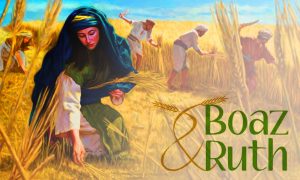
The Misconception of the Romance between Ruth and Boaz
Certainly, we all have a soft spot for a captivating love story, whether it’s the timeless tale of Romeo and Juliet, the emotional journey in The Notebook, the touching narrative of Sweet November, or the heartwarming story of Me Before You. As Christians, we also find inspiration in the romantic relationship between Ruth and Boaz. Well, some of us.
Allow me to personalize this narrative.
As a single woman, I often find myself facing the recurring question: “Why are you still single?” It seems as if there’s an expectation that I should take control of my romantic destiny. The underlying assumption is that unless I actively pursue a relationship, I might miss the chance to meet my “soul mate” or Mr. Right.
People close to me often suggest that in today’s world, men may struggle to pursue and win a woman’s heart, perhaps due to fear of past hurts. They argue that the skewed male-to-female ratio makes the dating scene feel like a game of “survival,” where bold or assertive women have the upper hand.
When I express my preference for trusting in God’s timing and guidance, or simply not feeling the need to actively pursue a relationship, friends often point to Ruth from the Bible. She’s presented as a godly woman who took bold and proactive steps to find her husband.
Let’s examine one of the misconceptions or philosophies surrounding the romance between Ruth and Boaz. As Christians, we believe in trusting God to script our perfect love story, to be our matchmaker. So, why is it challenging to let go and trust God through the journey? We must have faith that His guidance will lead us in the right direction.
Some of us, hesitant to completely surrender control, may look to the story of Ruth as an example of a woman who pursued or convinced a man to marry her.
Upon delving into the story of Ruth and Boaz, it may sound like Ruth was an aggressive woman who strategically approached Boaz in the field, engaging him in conversation and later making a bold move by lying at his feet. However, Ruth’s actions were not driven by aggression or calculation; she did not pursue Boaz.
I’m not suggesting that women shouldn’t be proactive in making themselves available or positioning themselves for potential suitors. After all, God is unlikely to send a spouse knocking at our door. We need to be proactive and trust that God will handle the rest. But in this case, the misconception lies in thinking that Ruth actively made advances toward Boaz.
A word of caution: My perspective on this beautiful story is shaped by my personal journey and my desire to deepen my understanding of God.
God is not a coincidental God. Ruth’s decision to leave her people and cleave to her widowed mother-in-law, Naomi, demonstrated selflessness. Ruth declared, “Where you go, I will go, and where you stay, I will stay. Your people will be my people and your God my God.” This profound commitment involved Ruth sacrificing her known life to accompany Naomi to Israel, revealing her selflessness.
Analyzing this verse, it appears that Ruth, in my opinion, completely denied herself. She relinquished her dreams, heart’s desires, and personal pursuits to serve Naomi and Naomi’s God, ensuring Naomi’s well-being. I believe Ruth felt compelled to follow Naomi to fulfill God’s prophecy in the Davidic line, as foretold in Isaiah 11:1-10, where a descendant of Jesse would rule with justice, faith, and establish true peace. Ruth’s decision to follow Naomi, in my view, was not coincidental but purposeful.


Ruth Meets Boaz in the Grain Field
Ruth 2:2-3 recounts the moment when Ruth, the Moabite, expressed her desire to Naomi: “Let me go to the fields and pick up the leftover grain behind anyone in whose eyes I find favor.” Naomi approved, and Ruth went out to glean in a field, unknowingly owned by Boaz from the clan of Elimelek.
Prior to this encounter, Ruth had never met Boaz and was unaware of the field’s ownership. She did not attempt to seduce or flirt with Boaz; instead, when Boaz first addressed her, she humbly bowed before him. In Ruth 2:10, she bowed down with her face to the ground and asked why she had found favor in his eyes as a foreigner. Boaz, initiating the conversation, instructed Ruth to stay in his field for safety and discreetly instructed his workers to leave extra grain for her.
Contrary to any notion of aggression, Ruth demonstrated humility. She did not pursue Boaz, and it’s crucial to recognize that Ruth had been previously married. Her commitment to Naomi, as she declared, “all that you say to me I will do,” guided her actions. Ruth only learned about Boaz when Naomi revealed his identity, describing him as a close relative and a guardian-redeemer—a legal term implying an obligation to redeem a relative in serious difficulty (referencing Lev. 25:25-55).
In verse 11, Boaz acknowledged Ruth’s selfless actions since the death of her husband, praising her for leaving her homeland to care for her mother-in-law. He blessed her, saying, “May the Lord repay you for what you have done. May you be richly rewarded by the Lord, the God of Israel, under whose wings you have come to take refuge.”
Even Boaz recognized Ruth’s humility and self-sacrifice. Her servant-like attitude toward her mother-in-law mirrored that of a dedicated servant.
Ruth and Boaz at the Threshing Floor
Naomi guided Ruth on a path to secure a brighter future. In Ruth 3:1, Naomi expressed her concern for Ruth’s well-being, asking, “Shall I not seek rest for thee, that it may be well with thee?” Following Naomi’s counsel, Ruth carefully followed her instructions to seek redemption from Boaz, while the Lord had orchestrated events to prepare Boaz for this act of redemption.
In Ruth Chapter 3, Naomi’s strategy to orchestrate Boaz’s marriage to Ruth becomes apparent. Naomi advised Ruth to uncover Boaz’s feet and lie down by them until he noticed her presence and instructed her further. Ruth responded, “I will do whatever you say,” reflecting her virtuous character. Ruth’s actions were not driven by personal desire or a well-thought-out plan but rather by her obedience to Naomi’s guidance. Although Naomi’s plan may have seemed unconventional to Ruth, who was unfamiliar with Jewish laws and customs, Ruth, out of respect and trust for her mother-in-law, committed to following every instruction.
Boaz, being a guardian-redeemer, was appealed to by Ruth to redeem Naomi’s family name. When Ruth revealed herself to Boaz, he acknowledged her kindness, noting that she had not pursued younger men, whether rich or poor. Boaz assured Ruth that he would fulfill her request, recognizing her noble character and virtue. He, however, informed her that there was another relative who held a closer relationship and might have a prior claim.
Examining the term “kindness,” Boaz commended Ruth’s loyalty to Naomi, the Lord, and himself. Ruth’s willingness to be redeemed by Boaz for the sake of Naomi’s family name and the fulfillment of prophecy showcased her selflessness. Boaz praised her virtue, acknowledging that she could have chosen a young, handsome, and wealthy man in Israel but instead chose to give herself to him. Ruth’s ultimate goal in marrying Boaz was to redeem Naomi’s family name, ensuring stability, security, and contributing to the bloodline of Jesus.
Ruth 3:18 captures Naomi’s wise counsel for Ruth to “sit still” until the matter unfolded, emphasizing that Boaz, a man of integrity, would act with urgency and fulfill his promise.
In times of waiting, Naomi recognized the importance of patience and drawing strength from God, trusting in His plan and the integrity of those involved.
They needed to wait on the Lord to reveal His plan to Boaz.
ChatGPT
ChatGPT
In Chapter 4:9, Boaz addressed the elders and the gathered assembly, declaring, “Today you bear witness that I have acquired from Naomi all the property of Elimelek, Kilion, and Mahlon. Furthermore, I have taken Ruth the Moabite, Mahlon’s widow, as my wife. This is to preserve the memory of the deceased with his property, preventing his name from fading among his family or hometown. Today, you are witnesses!”
While Boaz’s genuine affection for Ruth is undeniable, their marriage initially seemed like a strategic arrangement that later evolved into a true love story.
Boaz secured property through this union, redeeming Naomi’s family name and providing her with a sense of security. Simultaneously, Ruth gained both security and a son.
In the subsequent events depicted in Chapter 4, Boaz took Ruth as his wife. Through the divine intervention of the Lord, Ruth conceived and gave birth to a son. The women around Naomi praised the Lord, acknowledging that He had not left her without a guardian-redeemer. They expressed a wish for the son born to Ruth to become renowned throughout Israel, bringing renewal and sustenance in Naomi’s old age. The announcement of Naomi having a son brought joy to the community, and they named him Obed.
Obed went on to be the father of Jesse, who, in turn, was the father of David. Notably, Jesus, the descendant of David, carried forward this lineage (Romans 1:3).
The narrative emphasizes that Ruth’s blessings were not a result of a conventional boy-meets-girl love story. Instead, it highlights Ruth’s unwavering determination to care for Naomi, surrendering wholeheartedly to Naomi’s God. Ruth’s actions were not driven by attempts to entice Boaz or fast-track the romantic process; instead, they were rooted in her deep commitment to serving Naomi and her steadfast faith in God.
She completely yielded to God’s voice.
The question before us is: Can we trust in God and patiently await His perfect timing, allowing the man He has chosen for us to take the lead?
In my perhaps old-fashioned perspective, I firmly believe that God has the power to awaken the heart of the man we desire, prompting him to pursue us at the right moment. There is no necessity to wait for our “Boaz” because, thankfully, Jesus has already been sent by God to redeem us. This mirrors the role Jesus plays as our kinsman-redeemer, similar to Boaz’s role in Ruth’s life.
Instead of fixating on waiting for a specific person, consider seeking an “Isaac” or a “Joseph” and trust that God will provide what is truly best for you. This serves as a powerful reminder of God’s sovereignty in every aspect of our lives. If you are grappling with decisions, take them before the Lord and ask for clarity on His desires for you.
Let’s not become entangled in the cultural fantasy of waiting for a Boaz that church culture has propagated. As mentioned earlier, there is much more we can actively do as stewards of our future marriages. Titus 2 encourages young men and women to learn from the wisdom of older members within the faith. Seeking honest feedback from mentors or elders about areas for improvement can also be beneficial in preparing for marriage.
Proactivity rooted in faithful prayer can unveil opportunities we may have overlooked. However, it is crucial to acknowledge that men bear a unique responsibility in actively pursuing a spouse. Genesis 2:24 emphasizes that a man should leave his parents and cleave to his wife, and Proverbs 18:22 states, “He who finds a wife finds what is good and receives favor from the Lord.” Notably, it does not say “stumbles upon a wife,” indicating an intentional pursuit. Men are called to play their part in pursuing women of character and displaying leadership in the journey towards marriage.
Taking risks, such as the possibility of rejection, is a part of the process for men of faith and leadership rather than waiting for women to approach them.
In conclusion, let’s strive to accept God’s plan even when it diverges from our own expectations. Regardless of life’s surprises, God remains in control.
The most profound lesson gleaned from Ruth is the act of surrendering to God—surrendering desires, praying, listening, and obeying.
Read my previous post http://cecemoise.com/jovenel-moise-remembering-the-man-behind-the-dream/
Comments (0)